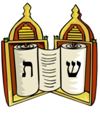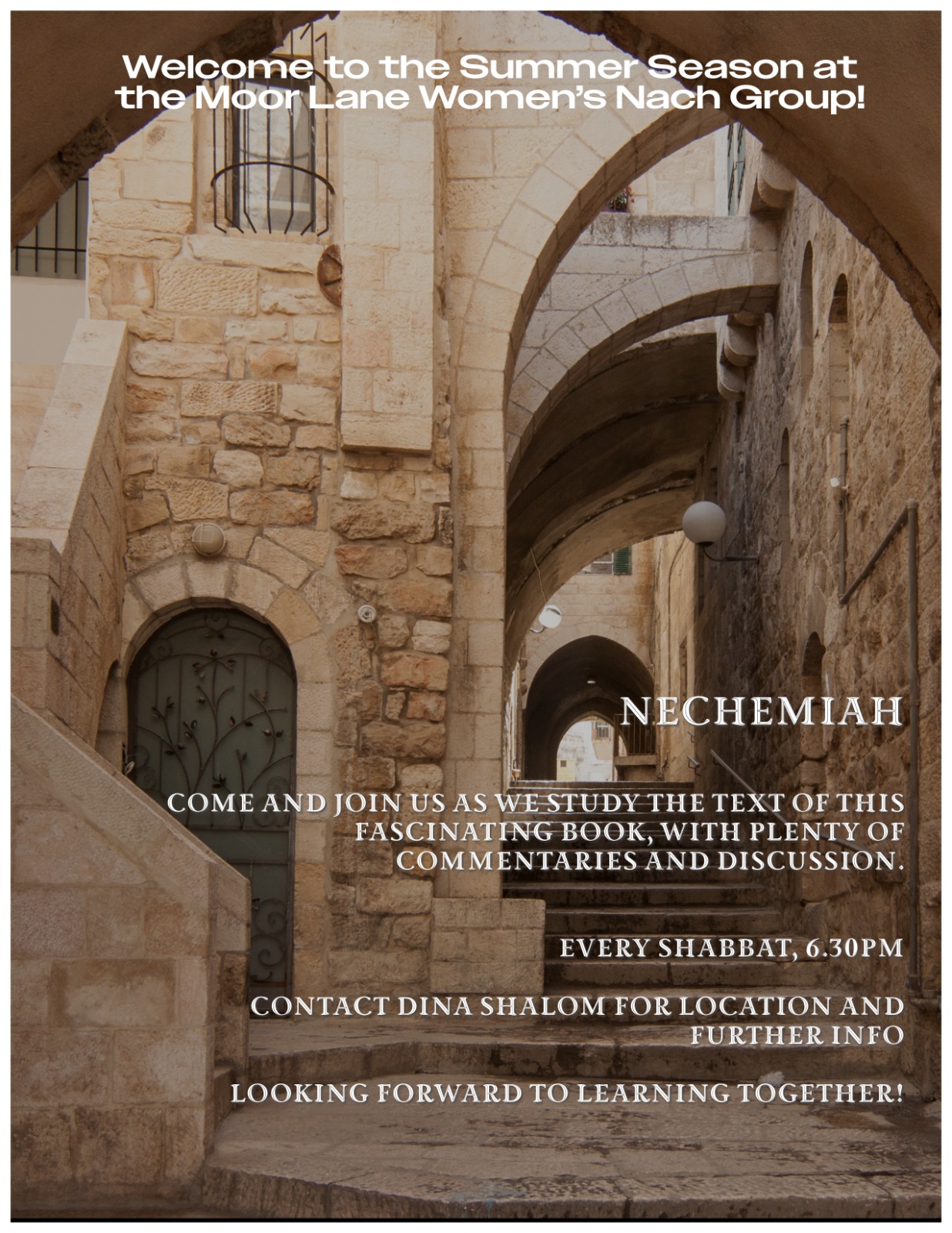
ק׳ ק׳ שׁערי תפילה

**********

******

**********

🗓️
לוח זמני תפלה לקיץ תשפ״ה
Summer Timetable 5785 – 2025
מוצאי שבת | ערבית )מוצ”ש( | שקיעה | סוף זמן קראת שמע | זמן שבת | פלג מנחה (תה״ד) | פלג מנחה (לבוש) | מנחה וקבלת שבת | תאריך | שבת פרשת |
Shabbat Ends | Arbit | Sunset | Shema to be read before | Candles to be |
| Earliest Candle lighting | Minha & Kabbalat Shabbat* | Date | Parasha |
PM | PM | PM | AM | PM | PM | PM | PM |
|
|
10:50 | 10:46 | 9:33 | 8:55 | 9:18 | 8:31 | 7:49 | 7:40 | 6/7 June | נשא |
🕯️SUMMER TIMES FOR SHABBAT 🕯️
שבת
קרבנות
9:00 am
הודו
9:15 am

פרקי אבות
6:20 pm
מנחה
6:30 pm
****

****
The Torah assigns the exact Mishkan-related tasks to be performed by the families of Gershon, Kehat, and Merari, the sons of Levi. A census reveals that over 8,000 men are ready for such service. All those ritually impure are to be sent out of the encampments.
If a person, after having sworn in court to the contrary, confesses that he wrongfully retained his neighbor’s property, he has to pay an additional fifth of the base-price of the object and bring a guilt offering as atonement. If the claimant has already passed away without heirs, the payments are made to a kohen.
In certain circumstances, a husband who suspects that his wife had been unfaithful brings her to the Temple. A kohen prepares a drink of water mixed with dust from the Temple floor and a special ink that was used for inscribing G-d's Name on a piece of parchment. If she is innocent, the potion does not harm her, but, rather, it brings her a blessing of children. If she is guilty, she suffers a supernatural death.
A Nazir is one who vows to dedicate himself to G-d for a specific period of time. He must abstain from all grape products, grow his hair and avoid contact with corpses. At the end of this period he shaves his head and brings special offerings. The kohanim are commanded to bless the people. The Mishkan is completed and dedicated on the first day of Nissan in the second year after the Exodus. The prince of each tribe makes a communal gift to help transport the Mishkan, as well as donating identical individual gifts of gold, silver, animal and meal offerings.
Ohr Somayach Institutions www.ohr.edu

אמן באמצע התפילה
שאלה: אדם המתפלל תפילת העמידה, וסיים את ברכת “שים שלום”, והחל באמירת “יהיו לרצון”, ובאותו הזמן השליח ציבור התחיל באמירת הקדושה (נקדישך ונעריצך וכו'), האם המתפלל רשאי להפסיק בתפילתו ולענות לקדושה, וכן לענות אמן על הברכות שהחזן מברך, או שאינו רשאי להפסיק בתפילתו?
תשובה: הדבר פשוט, שבשעה שאדם מברך איזו ברכה, אסור לו להפסיק באמצע הברכה לשום דבר, ואסור לו לענות אמן על ברכת חבירו, וכן אסור לו לענות לקדיש או קדושה.
והראיה לדבר, ממה שכתב מרן השלחן ערוך, שמי שרגיל לומר תחנונים, (כלומר, להוסיף תפלות ובקשות אישיות בסיום התפלה, באמצע אמירת אלהי נצור), ושמע “קדיש או קדושה”, יקצר בדבריו, ואם אינו מקצר, יכול להפסיק, “כדרך שמפסיק בברכה של קריאת שמע”.
מוכח מדברי מרן, שדין העומד באמצע “אלהי נצור” שווה לדינו של זה הנמצא באמצע ברכות קריאת שמע. והלא ההלכה היא, שבאמצע ברכות קריאת שמע אסור לענות אמן על ברכות. וכמו כן אסור לומר את כל נוסח הקדושה “נקדישך ונעריצך”, וכן אין לענות “ימלוך ה' לעולם” שבסיום הקדושה, אלא אך ורק לאמנים הראשונים שבקדיש, ולעניית “קדוש קדוש קדוש” ו”ברוך כבוד ה'” שבקדושה. ואם כן הוא הדין בשעה שעומד באמצע “אלהי נצור”, שאינו עונה אמן על ברכות.
וכן כתבו הרבה מרבותינו האחרונים, בדעת מרן השלחן ערוך, שהעיקר להלכה, שאין לענות באמצע אלהי נצור, אלא קדוש קדוש, וברוך כבוד ה', וחמשה אמנים הראשונים של הקדיש. ובעניית “אמן יהא שמיה רבא”, יענה עד “ולעלמי עלמיא יתברך”, ולא ימשיך עד “בעלמא” כמנהגו תמיד.
ולסיכום: בשעה שסיים אדם את אמירת הפסוק “יהיו לרצון” שבסיום ברכות שים שלום. רשאי לענות אך ורק על חמשת האמנים הראשונים שבקדיש, וכן רשאי לענות “קדוש קדוש קדוש”, ו”ברוך כבוד ה'”, בקדושה שבחזרת השליח ציבור.
Interrupting During the Amida Prayer to Answer Amen
Question: If one reciting the Amida prayer has concluded the “Sim Shalom” blessing and has begun reciting the following verse of “Yihyu Le’Ratzon” as the Chazzan begins the recitation of the Kedusha (“Nakdishach Ve’Na’aritzach”), may the individual praying interrupt his own prayer in order to answer Kedusha and Amen to the blessings being recited by the Chazzan or may he not interrupt his prayer at all?
Answer: When one is in the midst of reciting a blessing, one may not interrupt in the middle of the blessing for any matter, not even answering Amen to a friend’s blessing nor answering Kaddish or Kedusha.
Interrupting After Concluding the “Sim Shalom” Blessing
Nevertheless, once one concludes the “Sim Shalom” blessing of the Amida prayer and has recited the verse “Yihyu Le’Ratzon Imrei Fi Ve’Hegyon Libi Lefanecha, Hashem Tzuri Ve’Go’ali,” one will be in the midst of reciting the “Elohai Netzor” section and no longer retains the law of one who is standing in the middle of a blessing. At this point, one may interrupt to answer words of holiness. Thus, one may pause for a moment to answer the Kedusha being recited by the Chazzan and congregation.
To Answer Blessings
Hagaon Rabbeinu Yosef Haim writes in his Sefer Ben Ish Hai that from the moment one recites the “Yihyu Le’Ratzon” verse, one may answer any words of holiness including answering Amen to blessings one hears. The basis for his opinion stems from the words of Maran Ha’Chida in his Kesher Gudal who rules likewise in accordance with the ruling of the Turei Zahav. Hagaon Rabbeinu Ben-Zion Abba Shaul zt”l rules likewise.
The Opinion of Maran
On the other hand, Maran Rabbeinu Ovadia Yosef zt”l infers from the words of Maran Ha’Shulchan Aruch that the Halacha does not follow the above opinion. Only answering to Kedusha, i.e., reciting the verses of “Kadosh, Kadosh” and “Baruch Kevod Hashem Mi’mekomo,” is permitted after reciting the “Yihyu Le’Ratzon” verse. It is likewise permissible to answer the first five Amens of Kaddish at this point. Answering Amen to any blessing one hears at this point, however, is forbidden.
The proof to this is that Maran Ha’Shulchan Aruch writes that one who is accustomed to reciting supplications (i.e. personal requests and prayers one inserts at the conclusion of the Amida prayer, within the “Elohai Netzor” section) and hears Kaddish or Kedusha should shorten his prayers and if one does not shorten one’s prayers, one may interrupt “the way one would interrupt during the recitation of the blessings of Keri’at Shema.” Based on the words of Maran, the law of one in the midst of the “Elohai Netzor” section is equal to the law of one in the midst of reciting the blessings of Keri’at Shema. The Halacha is well-known that within the blessings of Keri’at Shema, one may not interrupt in order to answer Amen to blessings. One may likewise not recite the entire text of the Kedusha beginning with “Nakdishach Ve’Na’aritzach” nor may one answer the final verse of the Kedusha, “Yimloch Hashem Le’Olam.” Rather, one may only answer the first five Amens of Kaddish and the verses of “Kadosh, Kadosh” and “Baruch Kevod Hashem” of the Kedusha at this point. If so, the same applies within the “Elohai Netzor” section of the Amida and one may not answer Amen to blessings in the midst of reciting it.
Indeed, many great Acharonim interpret the opinion of Maran Ha’Shulchan Aruch that halachically speaking, the only things one may interrupt to answer within the “Elohai Netzor” section of the Amida are the verses of “Kadosh, Kadosh” and “Baruch Kevod Hashem” of the Kedusha and the first five Amens of Kaddish. Furthermore, when answering “Amen Yehe Shemeh Rabba” at this point, one may only do so until the words “Ul’almei Almaya Yitbarach” and not continue until the words “Da’amiran Be’Alma” as one would usually.
Summary: When one concludes reciting the “Yihyu Le’Ratzon” verse following the conclusion of the “Sim Shalom” blessing of the Amida, one may only interrupt to answer the first five Amens of Kaddish and the verses of “Kadosh, Kadosh” and “Baruch Kevod Hashem” of the Kedusha.